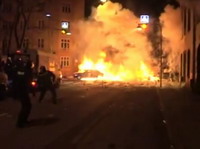Georgian riot police try to put down anti-government protest
Tear gas, rubber bullets and water cannon were used to break up demonstrations calling for the ouster of Mikhail Saakashvili.

Saakashvili, a U.S. ally who has tried to integrate Georgia with the West, accused Russia of fomenting the protests, which began last week. He said several Russian diplomats had been ordered to leave the country.
The violent confrontation between police and protesters, which played out live on Georgian and Russian television, has raised the stakes for opposition leaders and clouded the political future for the former Soviet republic, where a low-level tug-of-war between Russia and the West is being played out.
A Georgian television station regarded by the government as an opposition mouthpiece went off the air Wednesday night after riot police entered its headquarters. The Imedi station has carried statements by opposition leaders and broadcast footage of police dispersing the protests on Wednesday.
Clouds of tear gas enveloped parliament after riot police in helmets and gas masks advanced toward the crowd, pushing people back with shields and beating some with truncheons. Demonstrators retreated down Tbilisi's main avenue suffering from tear gas, fired by police from the beds of pickup trucks. Scattered fistfights broke out between uniformed police and protesters.
Several thousand opposition supporters rallied later in another section of Tbilisi, only to have the protest broken up again by riot police wielding water cannon and firing rubber bullets. TV footage showed protesters with bandannas and surgical masks pelting police with rocks from a bridge as the din of car horns and police sirens blared in the background.
More than 100 people were hospitalized in the running clashes throughout the day, the Health Ministry said.
In a nearly 30-minute televised address, Saakashvili said he regretted the use of force, but argued that it was necessary to prevent the country from sliding into chaos.
"Everyone has the opportunity to express their protest in a democratic country and I, as a democrat, have always defended the right of people to protest ... but the authorities will never allow destabilization and chaos in Georgia," he said, flanked by Georgian and European Union flags.
Saakashvili said the opposition leaders have been guided and funded by Russia, whose special services he said have stepped up their activities in Georgia.
"A country that has a lot of money and expertise has engaged a machine of lies and a mechanism of provocations," he said.
Shortly before his statement, Georgian television stations aired what they said was a taped conversation between opposition leaders and Russian Embassy officials. The opposition said it was a fabrication.
There was no immediate response from Moscow, but Russian Foreign Minister Sergey Lavrov has dismissed previous allegations by Saakashvili of Kremlin involvement in the protests as "farce."
Marina Kuparadze, 35, said she had supported Saakashvili - called by the diminutive of his first name, Misha - after he was swept into power by peaceful protests in late 2003.
"I voted for Misha back then, but after what he did today he has in fact become a political corpse," she said.
Despite the tensions, it was unclear how much of the country supported the opposition. Government officials, allied lawmakers and sympathetic Georgians said the force was justified, since the protesters had blockaded a major thoroughfare in Tbilisi.
"What was strange about breaking up the protests? Everything was done in the framework of the constitution. They were on the square for five days. They blocked transport," said Tariel Chagunava, 52, a Tbilisi lawyer. "What happened today is what would happen in any democratic country."
Opposition forces have gathered outside parliament every day since Friday, when more than 50,000 people rallied. The protesters initially called for changes in the dates of planned elections and the electoral system, but after Saakashvili rejected their demands and accused their leaders of serving the Kremlin, they made his resignation their central aim.
The daily demonstrations over the past week are part of the worst crisis that Saakashvili has faced since being propelled to the presidency following the 2003 Rose Revolution. A U.S.-educated lawyer who speaks English fluently, Saakashvili's often boyish enthusiasm brought hope to Georgians tired of endemic corruption and persistent poverty.
Many of Saakashvili's opponents support his aims, such as closer ties with the United States and Europe, and a visit by U.S. President George W. Bush in 2005 was a resounding vote of support for him from Washington.
While pressing closer Western ties, Saakashvili has sought to decrease Russia's influence and to establish central government control over two separatist regions that have run their own affairs with Russian support since wars in the early 1990s. Also, the small country's economy has improved, once-chronic power outages are far rarer and corruption is less pervasive than in the past.
But there has been growing disillusion with Saakashvili among critics who say he has not moved fast enough to spread growing wealth. Opponents accuse him of sidestepping the rule of law, creating a system marked by violations of property rights, a muzzled media and political arrests.
Russia, which views most countries of the former Soviet Union as its sphere of influence, has watched Saakashvili's turn to the West with alarm. Moscow moved to undermine Saakashvili by deepening ties with the separatist regions and imposing a trade and transportation blockade.
Subscribe to Pravda.Ru Telegram channel, Facebook, RSS!


